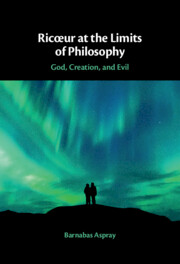Book contents
- Ricœur at the Limits of Philosophy
- Ricœur at the Limits of Philosophy
- Copyright page
- Dedication
- Contents
- Acknowledgements
- Introduction
- 1 Rage against the System
- 2 A Philosophy of Hope?
- 3 Absolutely no Absolutes?
- 4 Finitude and the Infinite
- 5 Finitude and Evil
- 6 Rightly Relating Evil and Finitude
- 7 The Poetic Symbol of Creation
- 8 The Mysterious Unity of Creation
- 9 The Original Goodness of Creation
- Conclusion
- Bibliography
- Index
7 - The Poetic Symbol of Creation
Published online by Cambridge University Press: 18 August 2022
- Ricœur at the Limits of Philosophy
- Ricœur at the Limits of Philosophy
- Copyright page
- Dedication
- Contents
- Acknowledgements
- Introduction
- 1 Rage against the System
- 2 A Philosophy of Hope?
- 3 Absolutely no Absolutes?
- 4 Finitude and the Infinite
- 5 Finitude and Evil
- 6 Rightly Relating Evil and Finitude
- 7 The Poetic Symbol of Creation
- 8 The Mysterious Unity of Creation
- 9 The Original Goodness of Creation
- Conclusion
- Bibliography
- Index
Summary
Can finite humans grasp universal truth? Is it possible to think beyond the limits of reason? Are we doomed to failure because of our finitude? In this clear and accessible book, Barnabas Aspray presents Ricœur’s response to these perennial philosophical questions through an analysis of human finitude at the intersection of philosophy and theology. Using unpublished and previously untranslated archival sources, he shows how Ricœur’s groundbreaking concept of symbols leads to a view of creation, not as a theological doctrine, but as a mystery beyond the limits of thought that gives rise to philosophical insight. If finitude is created, then it can be distinguished from both the Creator and evil, leading to a view of human existence that, instead of the ‘anguish of no’, proclaims the ‘joy of yes’.
- Type
- Chapter
- Information
- Ricœur at the Limits of PhilosophyGod, Creation, and Evil, pp. 167 - 185Publisher: Cambridge University PressPrint publication year: 2022

